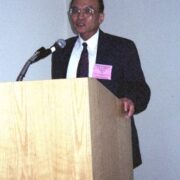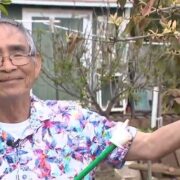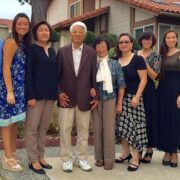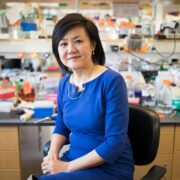My Overseas Life After 1988
Author: Thomas Tzu-shen Lin林資深
I was born on November 1, 1938. 1988 was a turning point in my life’s career. Before that, I had been striving to meet my father’s expectations and live up to his reputation, and it was for that reason I got my degree and guaranteed career. After 1988, I lived to fulfill my own and my family’s dreams – I choose to remain in the United States, free and at ease. In February 1988, I found out I had symptoms of high blood pressure. One day at nightfall, after eating dinner along with my prescribed high blood pressure medication (which did not yet have a doctor’s confirmation, I just relied on the statistics of efficacy on his patients), I walked with my dear wife to the nearby grocery ShopRite to go shopping. Once we got there, I said to my wife, “I am really tired, you go in by yourself. Come back soon.” I leaned against the cart, exhausted, and closed my eyes for a rest… When I woke up, I found I was in the corridor of the emergency room at Hackensack University Medical Center (HUMC), with an IV drip line dangling over me and my worried wife next to me. When she saw I was awake, her tears broke into a smile and she said, “I am so glad you woke up.” One month later, she told me she was worried she had lost me. She said, “When I found you, you were sprawled unconscious on the floor of ShopRite. The ShopRite manager immediately called 911 and an ambulance took you to HUMC. On the road, the paramedic told me that he could not detect Mr. Lin’s pulse or blood pressure, sending me into a panic.” When I woke up at HUMC, I secretly swore I would not die this way. For my wife was still young, and my kids were still immature though they had just entered high school. There were many things I had not yet done, like painting, which I dreamed of when I was little, or composing, learning the guitar, and writing etc. – all these dreams I hoped to fulfill in my life’s course. When I was discharged from the hospital, an Indian doctor wrote me up a diagnosis of “syncope,” and told me my doctor should change my high blood pressure medication.
In September 1988, I took a 10-week painting course for adults. I chose to work with acrylic because it dries quickly (after my illness I lost my patience, I could not wait for the colors to dry) and it is easy to mix colors. My first work was Monet’s five naked girls dancing in a field (it is still hanging on the wall of our bedroom); my second painting was a picture I cut out of the newspaper, “Nine dancers on stage” (It was finished in 1988. In 2007 my daughter informed me she wanted to save this painting). From 1995 to 1999, my daughter went to Tel Aviv, Israel to study medicine. Twice, not knowing the complexity of things, I sent her five oil pastel painting and several acrylic paintings by airmail to comfort her in her loneliness. One of these, “White house on a hillside of poppies,” was almost bought by a graduating classmate, but my daughter refused, for she wanted to collect her fathers’s paintings. Later, she returned to the US, got married, and settled in Los Angeles. She again collected many of my free drawings and my final work “White Lilies” (this was the most beloved piece of my wife’s grandmother. I published an article, “Wasp Attack” (胡蜂襲圖記), about it in my column “Ravings of an Autumn Bug”). In 1996, my son got married and I painted “Red sun rising over the sea” as his wedding gift, yet they refused it saying I had not completed the painting, though in my mind it was already complete. I completed all my paintings within 3 hours. And after finishing, I never repainted.
In February of 1989, I participated in a 10-week music composition class for adults. The teacher was a graduate of Julliard in New York, a Korean American. I forgot his name, but he had high expectations for his students’ performance; in the course of the semester five students dwindled to two, who were still at a loss. I quit after the first semester. Despite this, I managed to write a few decent songs.
In 1989 I ordered a guitar for 99 dollars, but never found a teacher to teach me. In July and August of 2006, I had a subdural hematoma in the right of my skull and had two surgeries, impeding my movement in my left leg from 2011 onwards. Then in February of 2013, I found Pastor Chungchi Lai of the Reformist church in nearby Fair Lawn who often played guitar while he preached and was happy to teach me. Yet on my first day of class I found I could not hold the guitar and had no choice but give up. The reason was I had neglected to do right wrist rehabilitation after my gut surgery in June of 2010 and malignant carcinoma in my right wrist in October 2010, for which the radiotherapy was only completed in January 2012. When my grandson came to my house on his 10th birthday, I gave him the guitar as a birthday gift. He, who also played cello, picked it up incredibly quickly. The gift clearly made him happy.
In December 1998, because of the recommendation of Ms. Shenghui Huang 黃勝惠 (her pen name is YeYe Chou 葉葉愁), Wenchang Lin 林文政 (the president of Pacific Times newspaper) and his wife Huina Lai 賴慧娜 invited me to open a column called “Ravings of an Autumn Bug” (秋蟲囈語). Every other week I wrote a short essay of about 1000 characters. Originally, I wanted to quit after June because nobody reacted. But with the steadfast encouragement of the president, I have trudged on to this day. I never thought I would write it for 12 years. I wrote only about my own experiences, never about politics; I discussed my reflections on life and books I read, writing reports as a freelance writer. With the enthusiastic help of Mr. Lin as well as Hsiaohui You as a transcriptionist and generous financial assistance from friends, I was able to publish 2000 copies of my volume, “Tonic Soup for the Taiwanese Soul” (台灣人心靈的補藥湯). The content was all the articles I published in my column in 2007. Thus, I was able to realize part of my dream. In 2011, due to a plethora of ailments I often had to take breaks from writing and the president promised to find an excellent writer to replace me. From then on, I did not write at set intervals. This writing process also fulfilled part of my childhood dream, and I would like heartily thank all those noble people I mentioned above.
One midday in February 1990, at a dinner in a rotary club, I happened to meet the person sitting in front of me who introduced himself as Joseph Lanciotti. He said he was very interested in my business (mail ordered medical supplies and equipment) and wanted to come to my company to help out free of charge. I agreed. On the morning of the next day, he really showed up and gave some suggestions for how to improve the logistics of business operation.
In the coming days he came back every day and we chatted about everyday things; I gradually came to understand his background. He had dropped out of high school because his family was poor and didn’t have money to send him to school. At age 19 he enrolled in the marines and served in Qingdao, China for a year. He had a deep impression of Chinese culture and Chinese women. Returning to the US, he got aid from the government, finished high school, and studied media studies at the University of Miami. After graduation he worked as a PR specialist at the NY – NJ Port Authority Bureau all the way until his retirement at age 65. He was three years older than me, and his wife was three years older than him, his childhood neighbor who taught elementary school and was called Vivian. They had two married daughters and two grandkids from the elder daughter. Once they both retired and saw each other every day they often quarreled, so Uncle Joe decided to find me to vent instead. Later he asked if I ever wrote Chinese poetry. And would I be interested in writing English poetry? I said my English vocabulary was limited and I didn’t know how to rhyme. He said, “English poetry nowadays is free form. It doesn’t need to rhyme and line structure need not be regular. It’s up to the poet’s free interpretation, as long as the verses have a cadence, and the artistic conception is graceful. The poetic meaning is up to the poet’s internal logic, while the poetic interpretation is the reader’s perception. Every reader will have a different reaction to each poem, therefore, if you never write an English verse with which to knock on the gate of modern English poetry, who will open the door for you? Besides, I can give you a push from behind.”
In Summer of 1993 I wrote the poem “My Children, My Joy” for him to critique. The next day he told me that Auntie Vivian’s eyes flowed with tears after she read it, and that there was not a thing he would change. He wanted to include the poem in his collection Overview Ltd. (Vol 1, No 1, Autumn 1993), and also asked me to translate to Chinese.
As written on page 17:
MY CHILDREN, MY JOY
I never invited my children to
come to this world.
However, they came.
I had not tried to know why I
came to this world,
Now, I know why I am here,
That’s my parents’ joy.
Someday –
I am not willing to say
farewell to my children.
My life in this world
I love them so much from
my heart, with my joy.
In the spring of 1994 (about the end of April), I wrote the poems “God’s Spice – Provincetown, MA” and “Homeless,” not thinking they would be published in Overview Ltd. yet again (Vol. I, No. II, Autumn 1994,P. 5).
“Homeless” is copied below:
HOMELESS
With dreams and blessings
I left my sweet home.
Thirty years in the United States.
I earned degrees, married, had children.
The seasons quickly come and go.
Smiles of parents fade in a impossible dream.
They sent their son into a paradise
And gave up their hope.
The friendly sky often takes me home,
And I wander alone through alien streets
Like a rootless flower on a empty pond.
In spring vacation of the same year, my friend Ramon Costancio (a Filipino lawyer) invited me to go to his time-sharing hotel and tour Cape Cod, Ma. Since we departed close to noon, we stopped at a small restaurant on the way for lunch. Walking in the door, we saw male and female customers sitting separately, men caressing each other and women kissing each other. The actions of our two families caused some commotion among the customers, so we had to retire from the scene. My impression from this spring travel was striking, and I wrote the following poem about it to record the experience: God’s Spice — Provincetown, MA
GOD’S SPICE – PROVINCETOWN, MA
The green curved highway 6
Reaches the tip of the north hook,
Provincetown just hangs down
From the reversed rainbow.
Gray clouds smear over the harbor.
No sails, thunder roars.
In the streets tourists group, and wander.
The neons flash 99, 66, 69 and 96.
Provincetown, MA was the destination for our two families’ time-sharing travel. With blue skies, white waters, red sand, and green hills, this was a famous tourist spot, and also a queer gathering space. While we were on the road that day the weather turned bad and a torrential rain came in. By the time we got to Provincetown a rainbow hung on the horizon over grey clouds and haze. The sights I saw and my reflections as a traveler were so profound I wrote them into a poem when I got home. The bible says God created humankind. I always thought humans were as diverse as man and woman, salt and sugar. But that crowd of homosexuals was as diverse as all the spices in food. On the road home I pondered how to express lesbian and gay in words of a poem and ended up using the shapes of numbers 99 and 66, with 69 being heterosexuals and 96 asexual relations. “Reversed rainbow” refers to the former NYS education consultant wanting to teach about sexual diversity starting in elementary school with the “Rainbow Plan,” yet in the end parents all over the city objected and the plan was shut down. The weather turning poor represents the spread of AIDS, like the smear of gray clouds.
On page 6 of the same book, Uncle Joe gave me a full-page introduction, and wrote in flying colors of my “gifted” and “simplified” poetry. Whether it is really so I am not sure.
In the beginning of November 1994, I received an invitation from Northwoods Press, Thomaston, Maine, to participate in a national poetry competition. After long consideration and consultation with Uncle Joe, with a spirit of new life and not caring about rankings, I entered the competition with my poem “God’s Spice.” Who would have thought that in May 1995 it would be selected as one of 33 honorable mentions! I received a poetry compilation as a prize (Ed. By Dr. Roy Schwartzman, a collection of the poetry contest winners). At the start of June, I received the book Voices from the Northwoods, with my poem on page 20 and my name in 6th place, as third place among the honorable mentions. This selection was an unexpected surprise, and the Costancio family shared in our pride, sharing the poem with Filipino friends everywhere. Uncle Joe and Auntie
In November 1999, I received another invitation from Century Press to participate in a national poetry / short story competition. I sent in five poems without hesitation. Then, in March 2000, I was notified three of my poems made it in. I was too thrilled to sleep, it felt like a dream!
These three poems are below:
EMPTINESS
The breeze dances with bamboo leaves,
Then silence follows.
The geese fly over mirrored lakes,
No shadows remain.
The hormones stimulate lusty desire,
Vacuum with deflation.
GOLD FISH
My daughter’s pet, 1988
Gift from the high school fair.
It swims alone.
From one inch, it grows to six.
Freely, no fear, no hunger.
Only algae for comfort,
No friends, no mates.
Ten years pass, it still lives.
Wish that God’s invitation never comes.
SPIRIT
Eyes dancing,
Body waving,
Blood boiling,
I fly into white clouds.
Thoughts singing,
Hair tangling,
Surround the entire sky.
My blooming spirit
Breaks into pieces,
Myself and I meet.
Because there were page number limitations, my two poems “Red Dragonflies” (a remembrance of catching dragonflies in my youth) and “Day Moon” (the sensation of a moon shining at noon) were not included in the book, The Century Anthology – 2000. The five fiction authors and six poets selected for the volume were all unknown emerging writers. My name came in last, with my poems on P. 69. Editor Robert W. Olmsted wrote: “This collection features superb fiction and poetry by “new” writers. “New” in the sense that they have not been frequently published; have not been properly introduced to the public. Consider this an introduction. Read and enjoy!
Since 2012, I have had new poetry published in the Pacific Times. My more mature poetry includes, “I Have no Regret” and “Color of Love.”
I retired in 2000. Yet while I do not work, I also do not rest. I hope to fill up my remaining life. I am excited to finish the book Taiwanese Proverbs (台灣諺語) together with my American-educated son Yimin 毅旻who within the year, to educate the world on Taiwanese culture.
(This article came out of invitation of a good friend in November 2013 and was completed on September 14, 2014. Mr. and Mrs. Lanciotti were sent into some unknown nursing home by their daughter at the end of 2011. My best friend Ramon died in 2008 of lung cancer. I am grateful to the patient care of my wife these past years, so that all went well and I could complete this article).
Source: Thomas Tzu-shen Lin
Translated from 114. 一九八八年以後我的海海人生[自傳紀實] / 林資深/2014/10 by T.A. Archives
Posted 2/8/2021

![114. 一九八八年以後我的海海人生[自傳紀實] / 林資深/2014/10 114. 一九八八年以後我的海海人生[自傳紀實] / 林資深/2014/10](https://taiwaneseamericanhistory.org/wp-content/plugins/contextual-related-posts/default.png)



